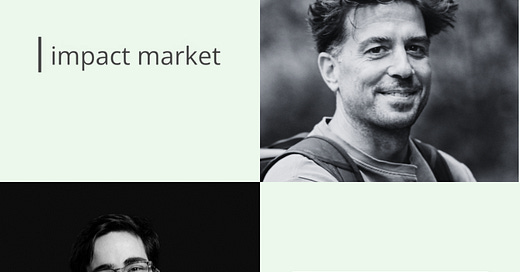Disclaimer from August Solliv: The views expressed are solely my own i.e. it’s my Sunday fun work 😉
Key insights:
Interview with Erdem Ovacik, Founder of Impact Markets, Founder and ex-CEO of Donkey Republic 🚲
Erdem is a big believer in impact markets - a marketplace where (primarily) governments pay companies and other organizations for a specific positive impact - or receive a payment in return for negative impact 💰
Impact start-ups today don’t fulfill their full potential in solving our various social and environmental challenges as governments don’t take all the start-ups’ positive and negative impacts into account 🏛️
Erdem gives the example of Donkey Republic, the start-up he founded, to show that they had a lot of positive impact, but it was not accounted for and they never got paid for it ⚖️
Thanks for reading Impact Supporters! Subscribe for free to receive new posts and support my work.
Greetings to 3k+ Impact Supporters! 🌍 This is August Solliv writing 👋 I have made an exception in this week’s newsletter! I am interviewing a founder and not a VC. I really believe in the topic of impact markets, so I was super excited to get Erdem on today. Let’s dive into impact markets (≈8 min reading time):
Definition of the concept of impact markets 📊
Data issue for impact markets 📉
Donkey Republic case 🚲
Think about impact markets as an impact VC 💡
Erdem’s current project 🔍
Meet Erdem Ovacik 👋
Erdem was born and raised in Istanbul 🇹🇷 and then moved to Denmark in 2007 after doing a master’s in public policy in the U.S. 🇺🇸 Erdem defines himself as a social & tech entrepreneur, especially focused on improving public governance and society with tech 💻
Erdem founded Donkey Republic, which he worked on for about 10 years, which was the world’s first app-based bike-sharing solution - born in Denmark 🇩🇰 He has now founded Impact Market, a marketplace for governments to provide funding for companies creating change they deem valuable, starting in mobility 🚦
Definition of the concept of impact markets 📊
Impact Markets bring together 1️⃣ those who want to see impact happening and 2️⃣ those who have a financial interest in impact. The typical provider of services in the market would be companies or other types of organizations that have data that can prove their impact - and the buyer would be public authorities and certain private companies with a long-term interest in specific, measurable social and environmental impacts taking place 📑
[Note from the author, August Solliv: So impact markets are an innovative way of doing public procurement to ensure that the government buys solutions that bring the impact that we want in society and don’t only focus on the monetary value of products and services.]
Erdem defines impact as a public good - i.e. typically the externalities that we don’t put a price tag on and that don’t go into the P&L but that have a lasting footprint. These impacts are usually driven by one or a few metrics, e.g. in education, it could be the number of children that learn to read and write. Erdem argues that the most important impact measures are not the same for all countries, states, and cities, e.g. Barcelona has an air pollution problem due to mopeds whereas Copenhagen has too many cars and traffic but no air pollution issues. And Erdem thinks that to be as correct as possible the impact must be defined democratically i.e. by a government or local institution 🚗
Ideally, an impact market would include both positive and negative externalities on all relevant identified metrics, to ensure a net-positive impact. This way, government spending for positive impacts can be sourced partially, or fully, by those creating the negatives.
Source: Ovacik, 2023
To explain it in simple terms, Erdem gives the example of how we run ads today vs 10 years ago. Outcome-based financing in impact markets is equivalent to PayPerClick Ads:
Source: Ovacik, 2025 (direct from the guest)
Data issue for impact markets 🔍
Erdem agrees that there are endless arguments for why impact markets are hard - to create. Any company that knows that they are somehow benefiting from some kind of exploitation of social environmental goods, would instinctively be against them. And we haven’t even really succeeded with one of the more ‘basic’ versions of an impact market, i.e. the carbon credit market, according to Erdem.
Erdem, however, believes that if we use big data and new technologies, we can track impact to a much larger extent than has ever been possible previously 🖥️ We don’t need to get to 100% accuracy but estimate the big negative and positive impacts on key metrics 📊 It, however, requires that we accept that the public sector collects and deploys our data for the benefit of the greater good - which few people are ready to accept today 🏛️
Source: Ovacik, 2025 (direct from the guest)
Donkey Republic case 🚲
Erdem had worked in social impact bonds before founding Donkey Republic so he was very aware of the impact that he was having with bike sharing 🚴 In bike sharing, the key role is to move a traveler from a car to a bike - as that has a positive impact on the person’s health (reduces the risk of cardiovascular disease, diabetes, and early deaths (Harvard, undated) ❤️ but also on sound pollution and environmental pollution 🌿
But the bike-sharing platform is not getting any benefit from the public value that it creates - it only gets some payment from its user. Erdem continues:
I've been proposing that there should be a more direct link between the cost of cars in cities to congestion charges as well as to the space consumed by cars to parking. That doesn’t exist in Denmark today. Parking prices have increased in these years, but they still do not correspond to the actual costs of space in Copenhagen, so added costs would make it more proportional.
It would mean pricing the externalities linked to cars. And then use some of that money to fund positive externalities that fight the negative externality: the space taken away, the air pollution. By the way, electric vehicles are also creating a lot of particle emissions through the wear and tear of the tires and brakes, which is not talked about. It's a problem. And of course, the congestion and the time spent there, not even to mention, the noise pollution. So you price in those externalities into mobility, and you put it in the impact market fund for mobility that would then pay for the shift to different modes of transport and business models enabling the shift.
The goal would be to focus on where people's behavior shifts probably need some kind of financial incentive. And the thinking follows what the EU is doing with CO2 cap and trade markets. Today, companies that are emitting too much CO2 pay those that are emitting less for their credits. So impact markets would apply the same principle for other public goods.
Think about impact markets as an impact VC 💡
Firstly, Erdem urges impact VCs to think about all their companies’ impact individually 🎯 He recalls from his Donkey Republic days that he would sometimes talk with impact VCs that would only track the emissions of their start-ups and here Donkey was doing quite poorly as they are a HW company with bikes - whereas some of the other PortCos were SW start-ups 🏢 However, in reality, Donkey was having much more impact in the city - it just didn’t get recognized 🏙️
Secondly, Erdem talks about mission drift. If he were an impact VC investor, he would be very aware that companies as they scale, tend to short-term profit maximize as the expense of impact. E.g. Erdem argues that Tesla is not necessarily a net-positive company, first of all, EVs are not necessarily net-positive, it depends primarily on 1. how much they increase car ownership, 2.. their relative size compared to the cars they’ve replaced, and 3. how long they last. Secondly Tesla is also pushing for autonomous driving, which would substantially increase car trips leading to more congestion and pollution.
[A note: Erdem mentioned that Daniel Schmartenberger had talked a great deal about this topic. I don’t have the exact link, but I can really recommend this interview with him, so check it out: (Norrsken, 2023)]
Erdem’s current project 🚦
Erdem is currently talking to a number of cities to start the first mobility impact market to fund new mobility solutions 🏙️ Erdem thinks that every vertical (like mobility) will require its own market as they require different data sources and assessment - he started with mobility as it’s a space he knows well 🚦
Congestion charges levied on cars could pay for free bike share and reduced cargo bike leasing.
Down the line, Erdem intends to build the big data products that are needed to enable the understanding of the linkage between products/services and behavioral change 📡
Platforms that enhance loneliness (i.e. Netflix) could pay for platforms that connect us and enhance belonging. Media that misleads and misinforms can pay for media that is informative and induces critical thinking. Unhealthy and environmentally taxing food can pay those that are better for us and the environment.
Erdem believes that there is a need for govtech to rethink the role of government. He wants to be part of ensuring that public funding, and more importantly, its legislative authority are being used optimally for our collectively desirable outcomes - and Erdem incites VCs to look thoroughly at govtech as better governance will continue to be a key part of our economies for years to come.
Source: Ovacik, 2023
[A quick note from the author: if you want to get inspired in this space, you can also take a look at OutcomesX that are building an impact market for philanthropy and foundations. And if you want to read one of Erdem’s own articles on the topic, it’s here: Ovacik, 2023]
Thanks for reading this week’s newsletter! Let me know what you think of this article and who else I should interview in this series - either in the comments section or in my DMs. Please subscribe to stay updated on articles about everything related to impact VC - and share with friends and colleagues. See you next week for another issue! 👋
~ August
(As these photos show, I’m an actual human writing this newsletter. Not AI. 🤖)
Links to articles/data mentioned:



















Share this post